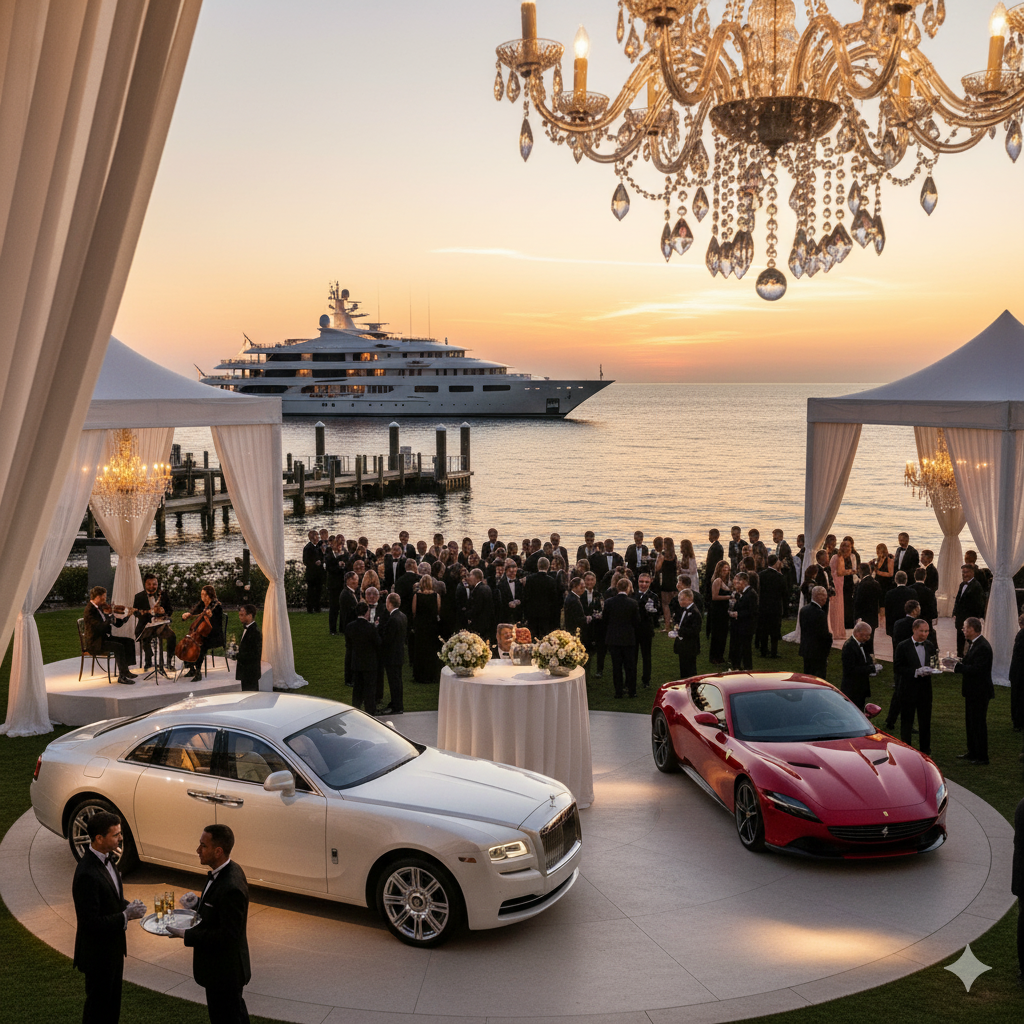How luxury brands transform exclusive experiences into measurable business outcomes through strategic experiential marketing
Executive Summary: The $100 Billion Experiential Investment
Ultra-wealthy consumers don’t buy products—they invest in experiences that define their identity. Consequently, luxury brands now allocate over $100 billion annually to experiential marketing programs globally. Moreover, these investments yield extraordinary returns when executed correctly.
Research reveals that 85% of consumers are more likely to purchase after attending live marketing events. Furthermore, luxury brands targeting ultra-high-net-worth individuals (UHNWIs) see even stronger results. Additionally, the most successful activations generate 10x ROI compared to traditional marketing channels.
This analysis examines how $500K+ experiential marketing events create measurable business impact. Specifically, we’ll explore proven strategies luxury brands use to convert exclusive experiences into sustained revenue growth. Ultimately, the data shows that experiential marketing has become the crown jewel of luxury brand strategy.
Why Experiential Marketing Dominates Luxury Consumer Psychology
Traditional advertising fails with ultra-wealthy audiences because these consumers already own everything. Instead, they seek emotional connections that transcend transactions. Therefore, experiential marketing creates psychological ownership before purchase occurs.
Neuroscience research demonstrates that memorable experiences trigger stronger emotional responses than static advertisements. Consequently, 91% of consumers report more positive brand feelings after attending events. Moreover, this emotional connection directly correlates with purchase behavior among luxury consumers.
Consider the exclusive appeal of Polo Hamptons, where luxury brands connect with high-net-worth demographics. Similarly, these curated experiences create perceived insider status that money alone cannot buy. Subsequently, attendees become brand ambassadors within their influential social circles.
The $500K Investment Framework: Where Every Dollar Goes
High-impact experiential marketing events require substantial financial commitment across multiple categories. However, successful luxury brands view these costs as strategic investments rather than marketing expenses. Additionally, the allocation framework ensures maximum return on experiential investment.
Venue and Location (30-40%): Exclusive locations like private Hamptons estates or Manhattan penthouses command premium pricing. Nevertheless, location directly impacts perceived event value among ultra-wealthy attendees.
Celebrity and Talent (25-35%): A-list performers or exclusive experiences with renowned personalities create unforgettable moments. Furthermore, celebrity appearances significantly increase social media amplification and media coverage value.
Catering and Hospitality (15-25%): Michelin-starred cuisine and premium hospitality set luxury experiences apart from standard events. Moreover, exceptional service creates lasting impressions that influence future purchase decisions.
Technology and Production (10-15%): Advanced lighting, sound, and immersive technology enhance experiential impact. Consequently, production quality directly affects brand perception among discerning luxury consumers.
Measurable Business Outcomes Beyond Brand Awareness
Sophisticated luxury brands track experiential marketing ROI through multiple performance indicators. Initially, basic metrics like attendance provide surface-level insights. However, advanced analytics reveal deeper business impact across the customer lifecycle.
Immediate Sales Conversion: Companies experience 10x higher ROI from event attendees versus non-attendees. Additionally, luxury brands report 25-34% average ROI from well-executed experiential campaigns.
Customer Lifetime Value: Ultra-wealthy consumers who attend exclusive events demonstrate significantly higher lifetime value. Furthermore, 70% become repeat customers after positive brand experiences.
Social Media Amplification: Exclusive events generate authentic user-generated content across social platforms. Moreover, attendees share experiences with their affluent networks, extending reach exponentially. Subsequently, brands benefit from organic advocacy among target demographics.
Media Coverage Value: High-profile events attract luxury lifestyle media attention worth millions in earned coverage. Therefore, calculated media value often exceeds initial event investment costs.
Case Studies: When $500K Events Transform Brand Equity
Leading luxury brands consistently demonstrate experiential marketing success through strategic event execution. Specifically, these case studies illustrate how substantial investments create measurable business transformation.
Porsche Unseen Shanghai: Rather than traditional advertising, Porsche created an exclusive exhibition where attendees viewed concept cars and interacted with designers. Consequently, the intimate experience deepened brand affinity among high-value consumers significantly.
Louis Vuitton 200 Visionaries: The traveling exhibition celebrating LV’s heritage toured global cities, creating localized luxury experiences. Meanwhile, invitation-only previews maintained exclusivity while reaching international audiences. Subsequently, the campaign generated massive global media coverage and social engagement.
Mercedes-Benz Fashion Week Activations: Mercedes elevates experiential marketing through sophisticated events beyond simple vehicle displays. Moreover, pop-up showcases in luxury shopping districts create entire environments embodying brand values.
These examples demonstrate how strategic experiential marketing creates lasting emotional connections. Furthermore, the investment in memorable experiences translates directly into increased sales and brand loyalty.
Digital Amplification: How Exclusive Events Scale Globally
Modern experiential marketing extends far beyond physical event boundaries through strategic digital integration. Initially, events create intimate experiences for select attendees. However, sophisticated content strategies amplify impact across global luxury audiences.
Social Media Strategy: Social media engagement increases by 34% for brands using experiential marketing campaigns. Additionally, exclusive event content creates FOMO among aspirational luxury consumers.
Influencer Integration: Luxury brands strategically invite influential attendees who share experiences with engaged followers. Moreover, authentic content from respected voices carries more weight than traditional advertising. Consequently, influencer participation exponentially increases event reach and credibility.
Virtual Reality Extensions: Advanced brands create VR experiences allowing global audiences to participate virtually. Subsequently, this technology democratizes access while maintaining exclusivity for physical attendees.
The synergy between physical experiences and digital amplification creates comprehensive brand engagement. Therefore, successful campaigns generate both immediate impact and sustained online conversation.
Future Trends: Where Experiential Marketing Meets Innovation
The evolution of experiential marketing continues accelerating as luxury brands embrace emerging technologies. Particularly, luxury wellness brands are investing heavily in immersive experiences for 2025. Additionally, innovative approaches combine physical luxury with digital innovation.
Metaverse Integration: Forward-thinking luxury brands experiment with virtual experiences complementing physical events. Moreover, NFT collections linked to exclusive experiences create new revenue streams. Subsequently, digital assets become status symbols within affluent communities.
Sustainable Luxury Experiences: Environmental consciousness increasingly influences luxury consumer behavior. Therefore, brands incorporate sustainability messaging into high-end experiential campaigns. Furthermore, eco-conscious events appeal to younger wealthy demographics prioritizing values alignment.
Hyper-Personalization: Data analytics enables unprecedented personalization in luxury marketing. Consequently, brands create individually tailored experiences for ultra-wealthy clients. Moreover, personalized touches increase emotional connection and perceived exclusivity.
Like the evolving landscape of luxury fashion trends in The Hamptons, experiential marketing adapts to changing consumer preferences while maintaining core principles of exclusivity and quality.
Advanced ROI Measurement: Beyond Traditional Metrics
Sophisticated luxury brands employ comprehensive measurement frameworks to assess experiential marketing effectiveness. Initially, basic attendance figures provide limited insights. However, advanced analytics reveal complex consumer behavior patterns and business impact.
Customer Journey Analytics: Leading brands track the complete customer journey from event attendance to purchase conversion. Additionally, advanced attribution models connect experiential touchpoints to revenue generation accurately.
Sentiment Analysis: Natural language processing analyzes social media mentions and reviews for emotional indicators. Furthermore, sentiment tracking reveals brand perception changes following experiential campaigns. Subsequently, brands optimize future experiences based on emotional response data.
Network Effect Measurement: Ultra-wealthy consumers influence extended social networks through word-of-mouth recommendations. Therefore, successful events generate cascading influence beyond direct attendees. Moreover, tracking referral patterns reveals true experiential marketing reach.
These sophisticated measurement approaches enable data-driven optimization of experiential strategies. Consequently, luxury brands achieve increasingly efficient resource allocation and higher returns on experiential investments.
Strategic Implementation: Building Your Experiential Marketing Framework
Successful experiential marketing requires systematic planning and execution across multiple organizational functions. First, brands must establish clear objectives beyond basic awareness goals. Subsequently, cross-functional teams coordinate complex logistics while maintaining luxury standards throughout.
Audience Curation: Ultra-wealthy consumers expect exclusive access and personalized attention at luxury events. Therefore, invitation strategies must balance exclusivity with business objectives. Additionally, guest list composition directly affects event atmosphere and networking value.
Partnership Development: Strategic collaborations with luxury venues, premium vendors, and complementary brands enhance event quality. Moreover, partnerships often reduce costs while increasing perceived value. Furthermore, collaborative events create cross-pollination between luxury customer bases.
Timeline Management: High-end experiential campaigns require extensive planning periods, often 6-12 months in advance. Additionally, luxury venues and talent book early, especially during peak seasons. Therefore, strategic calendar planning ensures access to preferred resources and optimal timing.
Successful implementation also requires contingency planning for weather, logistics, and guest management challenges. Ultimately, flawless execution separates memorable luxury experiences from disappointing investments.
Creating Sustainable Competitive Advantage Through Experience Design
Experiential marketing provides luxury brands with defensible competitive positioning that transcends product features. Unlike traditional advertising, memorable experiences create emotional barriers preventing customer defection. Moreover, successful experience design becomes increasingly difficult for competitors to replicate.
Brand Differentiation: Experiential marketing allows luxury brands to express core values and stories in ways that resonate deeply with consumers. Additionally, unique experiences become signature brand elements that distinguish offerings from competitors.
Customer Loyalty: Research indicates that 40% of customers report increased brand loyalty following experiential marketing exposure. Furthermore, luxury consumers who attend exclusive events demonstrate significantly higher retention rates and purchase frequency.
Premium Pricing Power: Brands associated with exceptional experiences command higher price premiums across product categories. Subsequently, experiential marketing investments create long-term pricing advantages that compound over time. Therefore, initial event costs generate ongoing revenue benefits through enhanced brand perception.
The compound effect of experiential marketing creates sustainable business advantages beyond immediate sales impact. Ultimately, brands that master experience design build unassailable market positions within luxury segments.
The Strategic Mandate: Experiential Marketing as Competitive Necessity
The luxury market has fundamentally transformed, making experiential marketing essential rather than optional for sustained success. Currently, only one-third of luxury brands experienced growth in 2024, highlighting intense competitive pressure. Therefore, brands must differentiate through exceptional experiences to capture ultra-wealthy consumer attention.
Moreover, changing consumer behavior patterns favor experience-driven brands across all luxury categories. Specifically, younger ultra-wealthy demographics prioritize authentic experiences over traditional status symbols. Consequently, brands failing to invest in experiential marketing risk becoming irrelevant to future luxury consumers.
Immediate Action Items: Luxury brands must allocate significant budget percentages to experiential marketing programs immediately. Additionally, organizations need specialized teams capable of executing complex, high-stakes experiences. Furthermore, measurement capabilities must evolve to track experiential ROI accurately.
Long-term Strategic Positioning: Experiential marketing represents the future of luxury brand building and customer acquisition. Therefore, early adopters who master experience design will dominate their respective categories. Subsequently, delayed investment in experiential capabilities creates increasingly insurmountable competitive disadvantages.
The evidence overwhelmingly supports experiential marketing as the highest-ROI strategy for luxury brands targeting ultra-wealthy consumers. Ultimately, brands that embrace this strategic mandate will thrive, while those that resist will struggle for relevance in the evolving luxury landscape.


